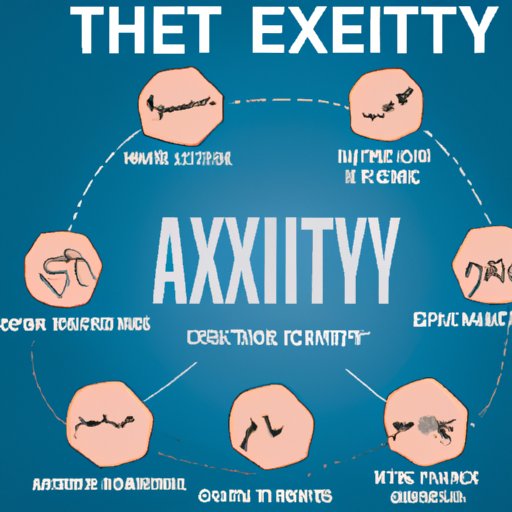
Introduction
If you’re struggling with anxiety, you’re not alone. According to the Anxiety and Depression Association of America, anxiety disorders are the most common mental illness in the United States, affecting 40 million adults every year. Anxiety can range from mild to severe and can interfere with daily activities, relationships, and overall quality of life. Fortunately, there are natural ways to manage anxiety and improve your mental health.
In this article, we’ll explore 7 natural ways to cure anxiety, learn tips and tricks from people who have overcome anxiety, discover the power of mindfulness, examine the science of anxiety and how to beat it, uncover techniques for coping with anxiety, and get help on how to find the right therapist.
7 Natural Ways to Cure Anxiety and Improve Your Mental Health
While medication is an option to manage anxiety, many people prefer natural remedies and lifestyle changes. Here are seven natural ways to manage anxiety.
Meditation
Meditation is a powerful tool to manage anxiety. It involves focusing your attention on the present moment and can help reduce worry and rumination. A daily meditation practice can also improve mood, increase self-awareness, and lower stress levels.
To start meditating, find a quiet, comfortable space and set a timer for 5-10 minutes. Sit with your back straight, close your eyes, and focus on your breath. When your mind wanders, gently bring your attention back to your breath.
Exercise
Exercise is one of the best natural ways to manage anxiety. It releases feel-good chemicals in the brain called endorphins, which can improve mood and reduce stress. Regular exercise can also improve sleep quality, boost self-esteem, and increase energy levels.
To get started, find an activity you enjoy, such as walking, jogging, yoga, or swimming. Aim for at least 30 minutes of moderate exercise most days of the week.
Balanced Diet
A balanced diet can play a crucial role in managing anxiety. Eating a variety of nutrient-dense foods can improve brain health and reduce inflammation in the body. Some foods that can help reduce anxiety include fatty fish, nuts, seeds, whole grains, and leafy greens.
On the other hand, limiting your intake of caffeine, alcohol, and processed foods can help reduce anxiety symptoms.
Journaling
Journaling is a useful tool for managing anxiety. Writing down your thoughts and feelings can help you process emotions, identify triggers, and find solutions to problems. It can also help you track your progress and identify patterns in your behavior.
To start journaling, set aside a few minutes each day to write down your thoughts and feelings. You can use a notebook, a digital document, or a journaling app.
Aromatherapy
Aromatherapy is the use of essential oils to improve mood and reduce stress. Some essential oils that can help reduce anxiety include lavender, chamomile, frankincense, and bergamot. You can use essential oils in a diffuser, massage oil, or bath salts.
Social Support
Social support is essential for managing anxiety. Having close relationships with friends and family can provide emotional support, reduce loneliness, and increase feelings of belonging. Joining a support group can also be helpful for sharing experiences and tips for managing anxiety.
Sleep Hygiene
Sleep plays a critical role in managing anxiety. Chronic lack of sleep can increase anxiety symptoms, while getting enough quality sleep can improve mood and reduce stress. Some tips for improving sleep hygiene include creating a relaxing bedtime routine, avoiding screens before bed, and keeping your bedroom cool and dark.
Overcoming Anxiety: Tips and Tricks from People Who’ve Been There
Learning from others who have overcome anxiety can be a powerful tool for managing your own anxiety. Here are some insightful tips and tricks for managing anxiety.
Practice Gratitude
Practicing gratitude can help reframe your thoughts and reduce anxiety. Take time each day to write down three things you’re grateful for, no matter how small they may seem. Focusing on the positive can help shift your perspective and improve your mood.
Focus on the Present Moment
When anxiety strikes, it’s often because we’re worrying about the future or ruminating about the past. Practicing mindfulness and focusing on the present moment can help reduce anxiety. Take a few deep breaths and focus on your senses. Notice what you see, hear, feel, and smell.
Challenge Negative Thoughts
Anxiety can be fueled by negative thoughts and beliefs. Challenge these thoughts by asking yourself if they’re true and if there’s evidence to support them. Then, reframe them in a more positive way. For example, instead of thinking “I can’t handle this,” reframe it as “I can handle this, and I’ll do my best.”
Practice Self-Care
Taking care of yourself is essential for managing anxiety. Some self-care practices include getting enough sleep, eating well, staying active, spending time in nature, and doing activities you enjoy. These activities can help reduce stress and improve mood.
Use Positive Affirmations
Positive affirmations can help rewire your brain and reduce anxiety. Choose affirmations that resonate with you, such as “I am calm and confident,” “I trust in my ability to manage anxiety,” or “I am worthy of peace and joy.”
The Power of Mindfulness: How to Use it to Combat Anxiety
Mindfulness is the practice of being present and non-judgmental. It can be a powerful tool for managing anxiety. Here’s how to incorporate mindfulness into your daily life.
Mindful Breathing
Mindful breathing is a simple but effective mindfulness practice. Find a quiet place to sit or lie down, close your eyes, and focus on your breath. Notice the sensation of the air entering and leaving your body. When your mind wanders, gently bring it back to your breath.
Mindful Walking
Mindful walking involves taking a leisurely stroll and focusing on your senses. Notice the sensation of your feet on the ground, the movement of your body, and the sights and sounds around you. When your mind wanders, gently bring it back to the present moment.
Body Scan Meditation
A body scan meditation involves paying attention to different parts of your body and noticing any physical sensations. Start at the top of your head and move down to your toes, noticing any tension or discomfort. When you notice a sensation, breathe into it and release it.

The Science of Anxiety and How to Beat It
Understanding the science behind anxiety can help reduce its power. Here’s a brief overview of the science of anxiety, root causes of anxiety, and evidence-based methods for managing anxiety.
The Science of Anxiety
Anxiety is a natural response to stress. When we perceive a threat, our bodies release stress hormones like cortisol and adrenaline, which trigger the fight-or-flight response. While this response can be helpful in dangerous situations, chronic stress can lead to anxiety disorders.
Root Causes of Anxiety
Anxiety can have many root causes, including genetics, brain chemistry, personality, life events, and environmental factors. Understanding the root cause of your anxiety can help you find the right treatment.
Evidence-Based Methods for Managing Anxiety
Cognitive-behavioral therapy (CBT) is an evidence-based method for managing anxiety. It focuses on changing negative thought patterns and behaviors that contribute to anxiety. Other evidence-based therapies for anxiety include exposure therapy, acceptance and commitment therapy (ACT), and dialectical behavior therapy (DBT).
Techniques for Coping with Anxiety: From Breathing Exercises to the Power of Positive Thinking
Coping techniques can be helpful for managing anxiety. Here are some examples of techniques to help manage anxiety.
Deep Breathing Exercises
Deep breathing exercises can help reduce anxiety symptoms. Find a quiet place to sit or lie down, breathe in deeply through your nose, hold for a few seconds, and exhale slowly through your mouth.
Affirmations
Positive affirmations can help reframe your thoughts and reduce anxiety. Choose affirmations that resonate with you, such as “I am calm and confident,” “I trust in my ability to manage anxiety,” or “I am worthy of peace and joy.”
Muscle Relaxation
Progressive muscle relaxation involves tensing and relaxing different muscle groups. Start with your toes and work your way up to your head, tensing each muscle group for a few seconds and then releasing.
How to Get Help for Anxiety: A Guide to Finding the Right Therapist
While natural remedies and coping techniques can be helpful for managing anxiety, sometimes professional help is needed. Here are some tips for finding the right therapist.
Ask for Recommendations
Ask friends, family, or your primary care physician for recommendations for a therapist. You can also search for therapists online or through your insurance provider.
Check Credentials
Make sure the therapist you choose is licensed and has experience treating anxiety disorders.
Consider Therapy Type
There are different types of therapy for anxiety, including CBT, exposure therapy, and interpersonal therapy. Consider which type of therapy best suits your needs.
Insurance Coverage
Check with your insurance provider to see what mental health services are covered.
Overcoming Anxiety: Personal Stories of Triumph and Transformation
Hearing from others who have successfully overcome anxiety can be inspiring and motivating. Here are some personal stories of triumph and transformation.
Casey’s Story
Casey struggled with social anxiety for years, but with the help of CBT, mindfulness, and positive self-talk, she learned to overcome her fears and live a full life.
Hunter’s Story
Hunter suffered from panic attacks and generalized anxiety disorder, but through exposure therapy and self-care, he learned to manage his anxiety and pursue his passions.
Conclusion
Managing anxiety can be challenging, but it’s possible. By incorporating natural remedies, coping techniques, mindfulness practices, and finding the right therapist, you can overcome anxiety and improve your mental health. Remember, you’re not alone, and there’s no shame in seeking help. Take action today and start your journey to overcome anxiety.





